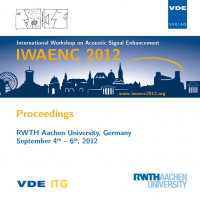Increasing the Robustness of Acoustic Multichannel Equalization by Means of Regularization
Conference: IWAENC 2012 - International Workshop on Acoustic Signal Enhancement
09/04/2012 - 09/06/2012 at Aachen, Germany
Proceedings: IWAENC 2012
Pages: 4Language: englishTyp: PDF
Personal VDE Members are entitled to a 10% discount on this title
Authors:
Kodrasi, Ina (University of Oldenburg, Institute of Physics, Signal Processing Group, Oldenburg, Germany)
Goetze, Stefan; Doclo, Simon (University of Oldenburg, Institute of Physics, Signal Processing Group, Oldenburg, Germany )
Abstract:
The performance of acoustic multichannel equalization techniques, which are based on estimating and inverting the room impulse responses (RIRs) between the source and the microphone array, is known to be very sensitive to estimation errors of the RIRs. In order to increase the robustness, it has been proposed to use regularization with the aim of decreasing the energy of the inverse filters. This regularization approach has been successfully applied to least-squares techniques such as exact and partial multichannel equalization based on the multiple-input/output inverse theorem (P-MINT). In this paper we incorporate regularization in the recently proposed relaxed multichannel least-squares (RMCLS) and channel shortening (CS) techniques and investigate its effectiveness on all considered equalization approaches. Experimental results for speech dereverberation show that using regularization in P-MINT and CS yields a significant performance increase both in terms of reverberant tail suppression as well as perceptual sound quality. Index Terms — acoustic multichannel equalization, robustness, channel estimation errors, regularization, dereverberation


